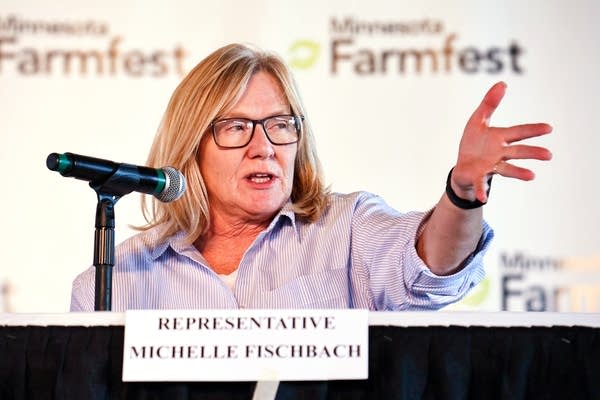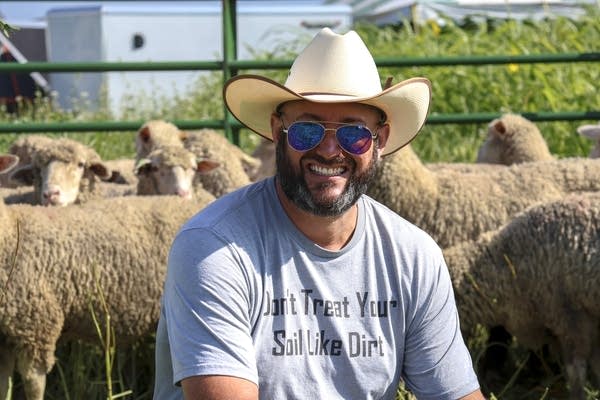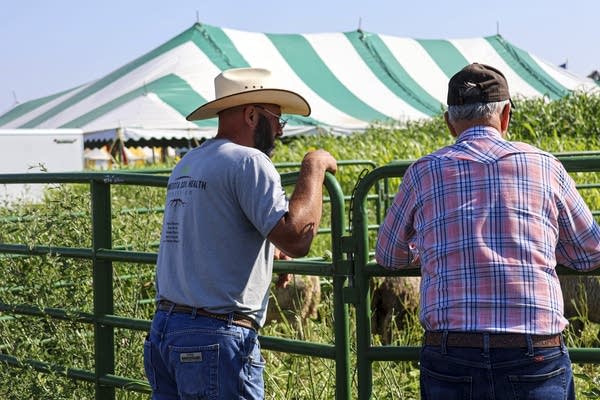
MN Reps discusses the budget bill and negatives in Farmfest
Agriculture has not been easy at all, but this year seems to be a particular challenge, with the high costs of inputs, violent storms that harm crops and some basic commodity prices. These fears occupied the center of the annual Minnesota Farmvist, which takes place this week in the southern part of the state.

Hundreds of people wandered through an open field in Redwood County on the opening day on Tuesday, where they gathered in the ranks of the new and tractors, a long sunflower spots, tents with sellers who display the latest agricultural tools and services.
There were even pens of livestock displayed, including a small hungry sheep that sponsors the fine corn.

In a red -like building, farmers, agricultural businesses and others have benefited from a rare opportunity to interact with senior federal officials on AG policies.
This was the first among many FarmFest Agricultural Policy Forums this week, and this was called “AG AG reliable”, to support farmers during times of economic uncertainty. It included a committee of four representatives of Congress in Minnesota, who were cut off from many agricultural rulings on the reconciliation bill signed by President Trump last month.
US Deputy Minister of Agriculture Stephen Faden led matters by describing what he says is great victories for farmers in what Republicans call the “big beautiful bill”, including a long increase in the reference prices of crops.
“Thanks to Congress, these provisions now reflect the cost that you have to pay every day,” said Vaden. “Make a farm safety network, again, something you can feel under you and that will protect your operations for years to come.”

Faden also addressed the Trump administration’s controversial trade war, which has already closed many international markets, including China, for the American Credit Corn, Soybeans and other crops. Nearly 30 percent of the agricultural exports in Minnesota are soybeans, and the atom is 14 percent, according to the Ministry of Agriculture in Minnesota.
“I know there is a lot of terror and uncertainty,” said Faden. “But there is one thing that I can tell you about, from the white building to here in Minnesota, is that every interaction focused on this administration in negotiating a new commercial deal that focuses on what it could do for American farms,” he claimed that the supreme tariff for the president and hearing in new commercial deals will ultimately benefit the producers of agricultural agriculture.

Republicans in the seventh province of Representative Michelle Fishbakh say that long distances in financing crop insurance, disaster relief, and increased real estate tax exclusion are other great victories for farmers.
“The goodness in this bill is overwhelming because of the tax rule.” “Because of the things we were able to do, not only for the AG community but for rural societies."
The only Democrat in the team, the American MP, Angie Craig, agreed that these provisions of the two parties are all worthy, but criticized $ 168 billion of sudden food aid – and a much larger lower medical care.
“When Medicaid cuts a trillion dollars, in addition, you hurt rural societies throughout our country,” Craig said. “Thus, it will harm it, it will harm the long term.”

Do not hear the voices of young farmers
Outside the forum, some of those attending Farm Fest, who moved away from the Public Policy Forum, said they do not believe that their voices are heard in Washington.
Bobby Polson, 38, near the small town of White, South Dakota, says high inflation and federal commercial policies force him to make major changes in his work.

“Our family for the first time in 60 to 80 years, (is) our farm does not knock this year,” he explained that it has turned into crop lands into pastures of livestock to take advantage of the high prices of beef, while the prices of corn and soybeans, which they used to plant.
“We see the directions that go on,” Polson said. “It is not sustainable to continue this dependence on federal programs for corn production and soybeans” when the demand for cow meat is very strong.

Others, too, are not happy with how their elected representatives deal with AG policy. Mark Guterres, 40, from Albert Lea is a product of poultry and eggs. In general, he said he was disappointed that Congress does not represent a farmer like him.
Guterres added that the majority of the focus was on the help of the largest corn farmers and soybeans, especially those who produce in the ethanol and vital lodes. He said that the small farms that grow or raise food products, such as letting it, is lagging behind.
“I do not feel this meaning, as our voices are heard in agriculture,” Guterres said. Certainly, they are not heard at the level of the small farm because we cannot afford ….“














Post Comment